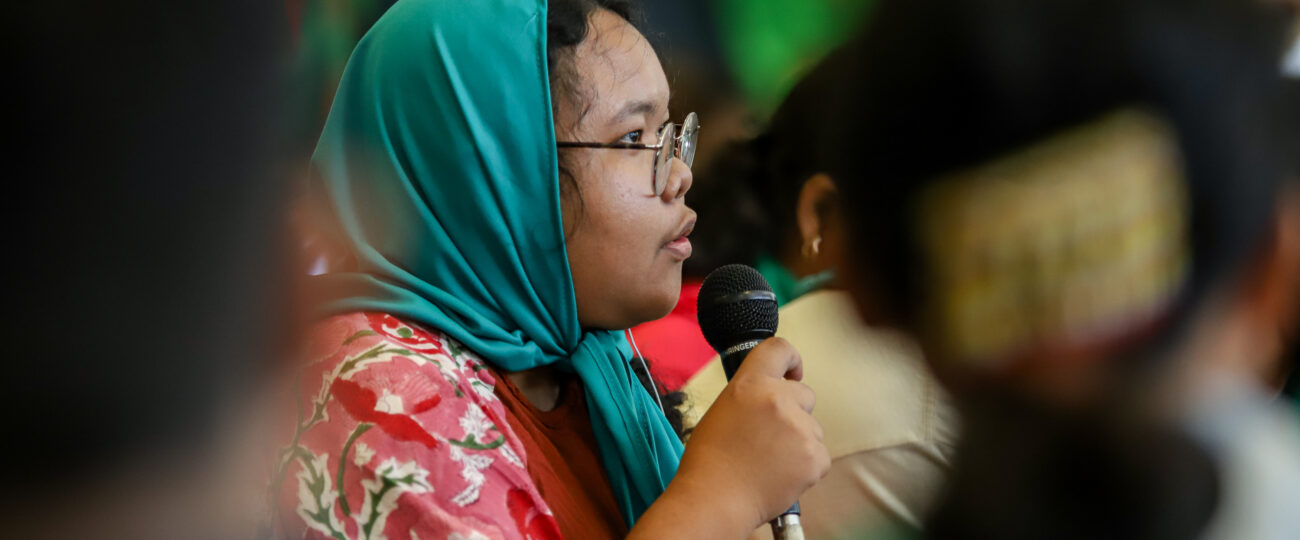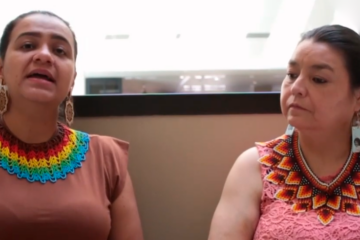Chayuda Boonrod is a member of the Assembly of the Poor (AoP), a grassroots organization based in Thailand that struggles for self-determination and right to resources with both rural and urban communities. Her participation in the struggle comes from her family, who is involved in the struggle for land in the country.
Chayuda shared with us aspects of the current political context of Thailand, and the struggle of AoP against dams’ impacts in the country. The Assembly of the Poor is active in the struggle against dams since it was formed, on September 10th, 1995. “I was born on the 31st, so I’m 21 days younger than the organization. Growing up, I saw my family, my aunts, and uncles, everyone that I know, engaging in one way or another with our organization and La Via Campesina” said Chayuda.
This interview was conducted during the 8th International Conference of La Via Campesina, held in December 2023 in Bogotá, Colombia. Together with La Via Campesina, AoP members have participated in activities both in the country and abroad. About this relationship between these two organizations, she adds: “We have many people from LVC coming to visit and study the communities”. Besides that, AoP hosted the LVC Asia Youth meeting, held on Oct 2022 in Surat Thani, Thailand. Read the full interview bellow.

Could you tell us about the political context of Thailand? What are the main issues to the working class and the peasants?
The elections held in 2023, which were enforced by the Constitution, put a new prime minister in power, but he wasn’t the one we chose. The political party that got the highest vote from the election was not able to form a government because they were obstructed by tricks that are hidden in the current Constitution, which was written by the military government installed after the coup d’état from 2014. Because the political party with the highest vote couldn’t establish the government, the second-largest political party was successful in forming a coalition government by getting support from political parties who were part of the previous military government.
The people feel that nothing has changed in terms of the response to their demands or the human rights question. They care about earning money, they don’t care about the people, particularly the poor. In October, AoP organized a mass mobilization that lasted one month to highlight these aspects of the current government and fight for our rights.
And what are the main issues with dams in Thailand now? What are the AoP struggle in relation to dams construction?
The struggle against dams’ constructions in AoP is big. It’s a battle we fight in many places since the creation of the organization. There is, for example, the struggle of the people against the Sirinthorn Dam, which is an early case of the history of the construction of dams in Thailand, around the year 1970, before the establishment of AoP. About the Sirinthorn Dam, the consequences and the suffering of the people become very obvious, but the government never had any attempt to cut down their ambitions in keeping it.
Talking about the current context, we can divide it into two types. One is the struggle against the dams that are already built. Another one is the struggle against the plan to build new dams. About the first type of struggle, there are five communities fighting against dams that are already built. The compensation the government said it was going to be given is not appropriate. For our brothers and sisters who are from these communities, their suffering will continue without a government’s response to solve the problems.
The government has a very simple formula to calculate the compensation. For example, if in a house they have five trees, the government might calculate only their value at that moment. They don’t consider how much value the five trees will have for the family in the long run. Our people feel that it would be better if the government exchanged land with them, find other land and give them to compensate for the land that they lost. But the government might do some easy thing like calculate a price of the land at that time, just give them money and let them go find new land, go buy new land themselves.
When, due to the construction of dams, the peasants lose their land, they lose their identity as peasants. They no longer have land to produce. For peasants, losing land means that everything is over. They have nothing, only their body and their labor.
Many of them have to migrate to a big town. In these big cities, the people become cheap laborer, urban poor, women falls into prostitution. So many more problems follow, like family breakdowns, or drug addiction. That is very concrete, but the problems go beyond with the loss of livelihood and biodiversity. In the case of the Rasi Salai Dam, studies discovered that almost half of the species of fish in the river disappeared. There are a lot of researches who study the impact of the dams, but the reseachers are just coming into the communities, talking to people and producing papers. They are not actively helping. And, because we are the ones fighting these issues for many years, the public started to see us as troublemakers.
The latest case, the Pong Khunpet Dam, is an example of how even though the dam construction is complete, the people refuse to move out because the government did not provide them with new land. The dam is not working completely, but they opened the water gate a little, which is causing flooding in the community. People are having to use boats for transportation. This water brings a lot of health issues and diseases. Of course, the response from the local government is very slow. Our people are doing demonstrations to pressure for a quicker response.
Many dams that exist now were built during the dictatorships. During the dictatorship governments, we couldn’t protest. That means that the issue of the dams are related to the political situation as well.
Many AoP communities protest against dams’ construction projects because they learned that they don’t produce any good for them. But, in most cases, what they get is just a pause on the project. There is no really stop or termination of the plan. We never know when they will just brush off the agreements and continue. It’s a perpetual concern.
The government tries to advertise for the good side of building dams. They try to convince people that you can just take the money and go stay somewhere else, go live somewhere else. Another discourse that the government uses to convince people is about the sacrifice, saying that they just want people to sacrifice themselves for the bigger good. But, in fact, there are many ways of managing water resources, other than just building dams. We know that dams are just good for the capitalists and the industry.
How is AoP’s struggle in building better life conditions for peasants in Thailand, and what’s the role of women in this struggle?
All the projects are initiated by the State, by the government, hand in hand with the capitalists. They never give any good to the people. But the struggles strengthened the movement and the people. We gained awareness that all the construction or development takes away our way of life, which is actually genuinely based in agroecological production.
The struggle brings about many initiatives, and a lot of members of our movement became interested in the initiatives of the agroecology school or the seeds’ project. One of the things that keeps them fighting is that many of them still remember the meaning of a good life. It is a kind of encouragement or inspiration for them to keep struggling in order to get that back.
The government silence and discourage people to make them feel that their struggle is really difficult, that they will not win. But this is not for us. For us, the more we struggle, more willingness we have to overcome whatever the government imposes on us.
The women in the Assembly of the Poor are a very fierce force. Within our structure, we ensure gender balance within all the bodies or activities, such as mobilizations, meetings or negotiations. Women are almost half of the movement, and they are able to fight with equal capacity as men.
In 2005 there was an international campaign on 1,000 women for the Nobel Peace Prize. Normally, the winners of the Nobel Peace Prize are men and individuals, but the women struggle collectively. At that time, our senior leader, Wanida Morsa, was approached by the project to give her name as one of the 1,000 women. She said that us, the women of the Assembly of the Poor, do not fight individually. So, instead of having her name as one of the 1,000 women, we signed a group of AoP members.
The peasant leaders who came before me are my inspiration. to look up and gain power. During the mass mobilization in last October 2023, a lot of women leaders of our movement that were present there suffered confrontations with the police. These mothers, aunts, and grandmas fought at the forefront with a very strong feminist force. The stronger the force, the easier it is to fight against the patriarchy that is embedded in the system. During the confrontation, our grandmothers could handle the situation, preventing the violence that could happen if there were men at the forefront.




